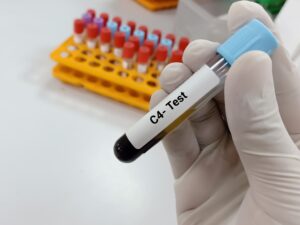 “Immunology in particular is the underlying basis for the science of rheumatology,” says Richard Bucala, MD, PhD, chief of rheumatology, allergy and immunology, Yale School of Medicine, New Haven, Conn. “However, the expansion in our immunology knowledge base, together with the increasing role of immune-targeted therapies, can challenge rheumatologists, who struggle to keep up with evolving knowledge.”
“Immunology in particular is the underlying basis for the science of rheumatology,” says Richard Bucala, MD, PhD, chief of rheumatology, allergy and immunology, Yale School of Medicine, New Haven, Conn. “However, the expansion in our immunology knowledge base, together with the increasing role of immune-targeted therapies, can challenge rheumatologists, who struggle to keep up with evolving knowledge.”
This knowledge explosion is the impetus behind a new review series in Arthritis & Rheumatology (A&R). The goal: Improve readers’ understanding of immunology and its latest advances, aiming to provide concise, practical knowledge for all rheumatologists.
“This isn’t simplified immunology for trainees,” says Dr. Bucala. “It’s for everyone. It’s practical, up to date and will fill knowledge gaps. It’s for seasoned practitioners and physician-scientists alike,” he emphasizes.
Dr. Bucala, the immediate past editor in chief of A&R, and current Editor-in-Chief Daniel H. Solomon, MD, MPH, introduced the new series in an article posted first online in October.1 “The reviews will provide state-of-the-art information but will strive to be concise and focused on practical questions in diagnosis or management raised by particular clinical scenarios,” they wrote.
The Complement System

Adobe Stock / Creative Vault
First up, Paul A. Monach, MD, PhD, reviews complement biology in the context of interpreting complement values in a suspected case of immune complex vasculitis.2
Setting a tone of accessibility and practicality for a complex topic, Dr. Monach starts his review of the complement system with a case presentation, which establishes the scientific question being addressed: “You are asked to evaluate a 53-year-old woman with recent onset palpable purpura of both lower legs. …” He then offers a high-level overview of the complement system.
“As with other aspects of innate immunity, the complement system has evolved to interact with the adaptive immune system to facilitate the anti-microbial effectiveness of immunoglobulins while retaining pathways for direct recognition of microbial structures,” writes Dr. Monach.
Clinicians will benefit from the callouts in the review article specifically designed to deliver information they can use in practice. Example: “A ‘bottom line up front’ message for clinicians is that a low level of circulating C3 or C4 is always abnormal (subject to the usual caveat that reference ranges are arbitrarily defined to cover 95% of the population) and is usually but not always indicative of a disease state, especially for C3. However, the disease states that deplete C4 are less diverse than those that deplete C3,” the article notes.
Dr. Monach continues, “Although depletion is the most common cause of low C3 and/or C4 encountered by adult rheumatologists, an understanding of the consequences of inherited and acquired deficiency states provides a useful background for interpreting laboratory tests, disease states characterized by depletion or local activation without overt depletion, and the benefits and risks associated with complement-blocking drugs.” He goes on to deliver a concise review of each area mentioned with direct relevance to diagnosis and treatment.
Before concluding his complement review, Dr. Monach returns to the introductory case to wrap it up and provide additional take-aways.
With illustrative figures and legends, and a wealth of references, this review gives clinicians practical information they can use with patients in their own practices.
Looking Forward
Future reviews in this series will discuss interferons in disease, autoantibody formation, pathologic T cell subsets, immune tolerance and newly characterized inflammatory syndromes.
All the reviews will include patient scenarios to establish the scientific questions being addressed. “One can’t see a clinical case in which one can’t extract a couple of interesting scientific questions,” says Dr. Bucala.
“We all talk and train immunology, but it’s didactic,” he says. He likens the approach to these review articles to “the power of bedside teaching. It’s about learning with your heart, not just your head.”
Rheumatologists are often called upon to solve medical mysteries to help patients who have been suffering for want of a clear diagnosis. These educational reviews are designed to help clinicians solve these mysteries and provide practical help to their patients.
Keri Losavio is the editor of The Rheumatologist, a position she has held since 2014.
References
- Bucala R, Solomon DH. Immunology for the rheumatologist: A&R introduces a new problem-based immunology review series with great educational potential. Arthritis Rheumatol. 2023. Accepted author manuscript.
- Monach PA. Complement. Arthritis Rheumatol. 2023. Accepted author manuscript.


